Can we have a discussion about Net Neutrality?
What are your views on it? What do you think will happen (socially and economically) were Net Neutrality to be repelled in the USA? To which point do you think whatever decision is reached will matter (to both customer and provider)? How does it affect the social sphere of the internet? What about its' geopolitical sphere? Is it feasible with the current infrastructure?
Internationally speaking, although the situation on the USA is the reason for most of the debate.
Some links:
https://en.wikipedia.org/wiki/Net_neutrality
https://www.reuters.com/article/us-usa-internet-exclusive/fcc-chief-plans-to-ditch-u-s-net-neutrality-rules-idUSKBN1DL21A
https://www.bloomberg.com/gadfly/articles/2017-11-21/net-neutrality-already-ended
/mlpol/ - My Little Politics
Archived thread
To be honest, I don't know what to think of it. I like free market economics but ips charging for services that were free to go on before is wrong, however its not for certain they would do that if nn was repealed but then again, I don't really know. As for the whole "government spying on you" thing, they would spy on you anyways without nn since those companies still receive the data you send on their sites and they can send it to the government anyways. From what I understand of it, it comes down to this: who do you want maintaining your internet, the government or big corporations that send your data to the government anyways.
I wont beat around the bush here, I barely know anything about net neutrality but its seems to me no mater what way it goes, it seems like a lose lose situation. Please if anyone wants to correct me please do, I could use some redpilling on this subject.
I wont beat around the bush here, I barely know anything about net neutrality but its seems to me no mater what way it goes, it seems like a lose lose situation. Please if anyone wants to correct me please do, I could use some redpilling on this subject.
>>89720
Net neutrality is good. The internet is the greatest information sharing tool on the planet, and the less anyone fucks with it the better. Free market or not, net neutrality must stay. This is also the reason I am upset about ICANN being handed over to the UN. The last thing we need are the chinks, Russians, and the EU having any access to how the internet is run.
Net neutrality is good. The internet is the greatest information sharing tool on the planet, and the less anyone fucks with it the better. Free market or not, net neutrality must stay. This is also the reason I am upset about ICANN being handed over to the UN. The last thing we need are the chinks, Russians, and the EU having any access to how the internet is run.
>>89720
Letting corporations control the media (in this case the internet) leads to far too much exploitation in my oppinion. They want it for their own monitary benifit, which is rubbish and goes against my principles. If it were a bit more regulated by the Gov't, now that I'm split on. Either they'd use it for good and police shit like child porn more so than they already do, or they'd use it for their own ideology like banning all 'hate speech' shit, which is also terrible for me. I suppose it comes down to who's got the control.
All in all, proper net neutrality is probably the best solution anyway, because the fears about those in power misusing the ability to police the internet are abolished. I'd rather just have the neutrality than have someone exploit the system for their own gain.
Letting corporations control the media (in this case the internet) leads to far too much exploitation in my oppinion. They want it for their own monitary benifit, which is rubbish and goes against my principles. If it were a bit more regulated by the Gov't, now that I'm split on. Either they'd use it for good and police shit like child porn more so than they already do, or they'd use it for their own ideology like banning all 'hate speech' shit, which is also terrible for me. I suppose it comes down to who's got the control.
All in all, proper net neutrality is probably the best solution anyway, because the fears about those in power misusing the ability to police the internet are abolished. I'd rather just have the neutrality than have someone exploit the system for their own gain.
I'm also conflicted on the subject. I do not want the government to control the Internet nor do I want big corporations to do so. We're caught between a rock and a hard place. Still, I'd rather take the option that is more decentralized and therefore harder to control. If corporations exploited the internet to a large degree they would face a major backlash, whereas too many people are still too trusting in government.
>>89778
>If corporations exploited the internet to a large degree they would face a major backlash
I wish this was true, however since most cooperation normally control the media as well, and the government as well I doubt anything will really change. If anything this is a non-issue. That said I like how things are run as of now so I'm not a huge fan of changing the status quo on this.
>If corporations exploited the internet to a large degree they would face a major backlash
I wish this was true, however since most cooperation normally control the media as well, and the government as well I doubt anything will really change. If anything this is a non-issue. That said I like how things are run as of now so I'm not a huge fan of changing the status quo on this.
>>89726
I've never really been able to make up my mind on this issue either frankly. I think you hit the nail on the head in suggesting that it's basically a choice between having the internet controlled by the government of having it controlled by large corporations, neither option being desirable imo.
I think whichever way this ends up going, more effort needs to be put into developing a decentralized internet that doesn't require going through an ISP to begin with.
I've never really been able to make up my mind on this issue either frankly. I think you hit the nail on the head in suggesting that it's basically a choice between having the internet controlled by the government of having it controlled by large corporations, neither option being desirable imo.
I think whichever way this ends up going, more effort needs to be put into developing a decentralized internet that doesn't require going through an ISP to begin with.
>>89720
I am for net neutrality.
They work on tanking away our net and turn it into restricted, monitored and censored shekel machine that is only for "correct" media, "correct news" and adds.
Until there is a better plan I think the net and the free flow of information is our best and most needed weapon.
Any way they fuck with it can only lead to bad results for us.
I am for net neutrality.
They work on tanking away our net and turn it into restricted, monitored and censored shekel machine that is only for "correct" media, "correct news" and adds.
Until there is a better plan I think the net and the free flow of information is our best and most needed weapon.
Any way they fuck with it can only lead to bad results for us.
We've had what, 20ish years of a free and open internet…
And two years under Barrack Obama's "Net Neutrality" power-grab. During that time, we've seen censorship, deplatforming of the right, search result manipulation, all that jazz.
But with a name like "Net Neutrality", you can't publically say "I'm against Net Neutrality" without sounding like… Well, you know.
And two years under Barrack Obama's "Net Neutrality" power-grab. During that time, we've seen censorship, deplatforming of the right, search result manipulation, all that jazz.
But with a name like "Net Neutrality", you can't publically say "I'm against Net Neutrality" without sounding like… Well, you know.
>>89882
Without net neutrality things would be even worse. ISP's Could block access to things on a whim. Fuck that. I'm not going to upgrade to the premium Ultra package for $50 just to watch Netflix. Government is a necessary evil to prevent this.
Without net neutrality things would be even worse. ISP's Could block access to things on a whim. Fuck that. I'm not going to upgrade to the premium Ultra package for $50 just to watch Netflix. Government is a necessary evil to prevent this.
it's bullshit, it's never done anything and never will except if it dies netflix and other shit services that hog bandwidth will be screwed over. We need a whole new internet somehow, cram together mesh networking, peer-to-peer networking along with stuff like http://www.broadband-hamnet.org/ and https://zeronet.io/
also to anyone who supports net neutrality you're on the same side of this issue as Barack Soetoro, John Oliver, Mark Zuckerberg, and of course this guy: https://twitter.com/georgesoros/status/789771190390890496
>>89913
Idk though. Is that necessarily a reason to be against it? I want to learn more about it first.
Idk though. Is that necessarily a reason to be against it? I want to learn more about it first.
>>89720
The only thing I know about Net Neutrality is that everyone on the internet hates it… for some reason
The only thing I know about Net Neutrality is that everyone on the internet hates it… for some reason
>>89918
In all the years I have been on the internet, I have never seen any article, social media post, or anything praising it
In all the years I have been on the internet, I have never seen any article, social media post, or anything praising it
>>89927
Eh, maybe I get it backwards and everyone loves it and no one hates it. Either way, everything I see on it has been entirely one sided. Like the collective has its mind made up on the issue
Eh, maybe I get it backwards and everyone loves it and no one hates it. Either way, everything I see on it has been entirely one sided. Like the collective has its mind made up on the issue
>>89922
literally everyoen bangs on about how important it is, and how fighting for net neutrality is "saving the internet." it's just some load of bullshit where people let big government fuck with ISPs because ISPs are terrible, but the fucking they get doesn't actually do anything but make them worse by killing the potential for competition
literally everyoen bangs on about how important it is, and how fighting for net neutrality is "saving the internet." it's just some load of bullshit where people let big government fuck with ISPs because ISPs are terrible, but the fucking they get doesn't actually do anything but make them worse by killing the potential for competition
>>89897
The real problem is the effective monopolies that many ISPs have. The response to an ISP playing thought police should be the customers taking their business elsewhere and putting the censors out of business.
Governments have repeatedly proven themselves that they can't be trusted. Just look at the Orwellian nightmare in Europe and especially Germany's thought crime laws. The protections of the US constitution and notably the first amendment is an anomaly that most nations don't enjoy and that the left is constantly trying to undo. Heaven forbid that they succeed someday.
The real problem is the effective monopolies that many ISPs have. The response to an ISP playing thought police should be the customers taking their business elsewhere and putting the censors out of business.
Governments have repeatedly proven themselves that they can't be trusted. Just look at the Orwellian nightmare in Europe and especially Germany's thought crime laws. The protections of the US constitution and notably the first amendment is an anomaly that most nations don't enjoy and that the left is constantly trying to undo. Heaven forbid that they succeed someday.
1511403906.png (699.0 KB, 2000x2000, Derpibooru reacts to Net N….PNG)
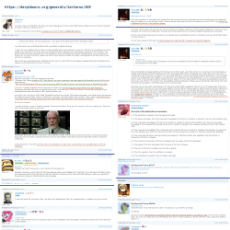
Derpibooru mods keep crying about NN and blame Trump all things.
Fact: it's actually different.
Interesting thread. Capped before mods goes banhammer-happy.
https://derpibooru.org/generals/tartarus/469
https://derpibooru.org/generals/tartarus/470
https://derpibooru.org/generals/tartarus/471
Fact: it's actually different.
Interesting thread. Capped before mods goes banhammer-happy.
https://derpibooru.org/generals/tartarus/469
https://derpibooru.org/generals/tartarus/470
https://derpibooru.org/generals/tartarus/471
>>89950
>16 duck badges
Why have they chosen "Duck" as their new label-word to replace "Troublemaker", "Racist", "Drama-Queen", and "Sexist"?
>16 duck badges
Why have they chosen "Duck" as their new label-word to replace "Troublemaker", "Racist", "Drama-Queen", and "Sexist"?
>>89897
>having netflix
>recycling "Muh netflix and ISP throttles!" bullshit from plebbit
>USA flag
For shame.
>having netflix
>recycling "Muh netflix and ISP throttles!" bullshit from plebbit
>USA flag
For shame.
>>89950
I like the bit where the admin desperately wants to ban someone for the sin of disagreeing with him but lacks the critical thinking skills to discern whether or not his target is actually disagreeing with him.
I like the bit where the admin desperately wants to ban someone for the sin of disagreeing with him but lacks the critical thinking skills to discern whether or not his target is actually disagreeing with him.
>>89918
People only hated it before because it was packaged with spy bills. This time (to my knowledge) it isn't.
People only hated it before because it was packaged with spy bills. This time (to my knowledge) it isn't.
>>89914
> Is that necessarily a reason to be against it?
the fact that you think that anything kikes with god complexes like zuckerburg and soros want could be anything but bad troubles me.
> Is that necessarily a reason to be against it?
the fact that you think that anything kikes with god complexes like zuckerburg and soros want could be anything but bad troubles me.
Today, Federal Communications Commission Chairman Ajit Pai circulated to FCC Commissioners a draft order in the Restoring Internet Freedom proceeding. Acting Federal Trade Commission Chairman Maureen K. Ohlhausen provided the following statement:
“I am pleased to see progress on this important matter. The FTC has long applied its competition and consumer protection expertise to network neutrality issues. The FTC also participated in the FCC’s proceeding, and I am gratified that my comments and those of FTC staff appear to have been taken into consideration in the development of this order. I look forward to reading the full draft order. The FTC stands ready to protect broadband subscribers from anticompetitive, unfair, or deceptive acts and practices just as we protect consumers in the rest of the Internet ecosystem.”
FCC Chairman Pai has announced that a draft of the order will be made public on Wednesday, Nov. 22, 2017. The FCC plans to vote on the report and order on December 14, 2017.
The Federal Trade Commission works to promote competition, and protect and educate consumers. You can learn more about consumer topics and file a consumer complaint online or by calling 1-877-FTC-HELP (382-4357). Like the FTC on Facebook
(link is external)
, follow us on Twitter
(link is external)
, read our blogs and subscribe to press releases for the latest FTC news and resources.
https://www.ftc.gov/news-events/press-releases/2017/11/statement-acting-ftc-chairman-maureen-k-ohlhausen-restoring
https://apps.fcc.gov/edocs_public/attachmatch/DOC-347935A1.pdf
What does Chairman Pai’s proposal really do?
Increases uncertainty for consumers, ensuring that broadband providers could block or throttle at a whim.
Threatens innovation at the edge, by allowing broadband providers to charge tolls to access their customers.
Enables offerings that favor the vertically integrated broadband provider’s own content and services over those of consumers and innovators who rely on the Internet to grow their own businesses and stay informed.
Prevents states and localities from adopting any related consumer protections –an action that is likely unlawful.
Undoes the light-touch, court-approved Title II classification of broadband Internet access service that was modeled on the wildly-successful approach to mobile voice, and returns to an unregulated approach where broadband providers reign supreme and customers with complaints have no redress at the FCC.
2
Empowers a federal agency that has never enforced net neutrality protections (the FTC) to manage consumer complaints ensures that there is no FCC recourse for wronged consumers or businesses.
https://www.ftc.gov/system/files/documents/public_statements/1231563/mko_rif_comment_7-17-2017_final.pdf
https://www.fcc.gov/consumers/guides/open-internet
Whenever it comes to these issues on net neutrality, it is best to see what the Commissions are actually saying, not what others say. From here, you can see the divide on the issue. There's pros and cons on net neutrality such as transparency requirements for ISPs, however a lot of it barely addresses the infrastructural issues of America's Internet. Net neutrality of course as a principle is welcomed when dealing with the meddling of both corporate and governmental problems, however it seems the issue comes down to the partisan issue on who you want to be in control of the internet, ISPs or the government? It's a lose-lose situation. The real solution is taking down these ISP monopolies because they'll be shitty either way. And, you can do that with either competition (which is in favour of taking down these regulations) or again with competition but with tactile intervention. This is mostly an American issue down to its core dressed up as a debate universal principles. My advice to look another nation that does it right like Britain for example:
"Looking ahead, the market is mobilising to deliver ultrafast services, including gigabit services on demand. Government’s role in supporting industry is to remove barriers to investment, to cut the red tape that increases the cost of rollout, and to ensure the continuance of the stable regulatory framework that makes the UK such an attractive place to invest."
source: https://www.gov.uk/government/publications/the-digital-communications-infrastructure-strategy/the-digital-communications-infrastructure-strategy
I'm sure there's some bi-partisan agreements to made in concession in order to fix America's Internet Infrastructure.
“I am pleased to see progress on this important matter. The FTC has long applied its competition and consumer protection expertise to network neutrality issues. The FTC also participated in the FCC’s proceeding, and I am gratified that my comments and those of FTC staff appear to have been taken into consideration in the development of this order. I look forward to reading the full draft order. The FTC stands ready to protect broadband subscribers from anticompetitive, unfair, or deceptive acts and practices just as we protect consumers in the rest of the Internet ecosystem.”
FCC Chairman Pai has announced that a draft of the order will be made public on Wednesday, Nov. 22, 2017. The FCC plans to vote on the report and order on December 14, 2017.
The Federal Trade Commission works to promote competition, and protect and educate consumers. You can learn more about consumer topics and file a consumer complaint online or by calling 1-877-FTC-HELP (382-4357). Like the FTC on Facebook
(link is external)
, follow us on Twitter
(link is external)
, read our blogs and subscribe to press releases for the latest FTC news and resources.
https://www.ftc.gov/news-events/press-releases/2017/11/statement-acting-ftc-chairman-maureen-k-ohlhausen-restoring
https://apps.fcc.gov/edocs_public/attachmatch/DOC-347935A1.pdf
What does Chairman Pai’s proposal really do?
Increases uncertainty for consumers, ensuring that broadband providers could block or throttle at a whim.
Threatens innovation at the edge, by allowing broadband providers to charge tolls to access their customers.
Enables offerings that favor the vertically integrated broadband provider’s own content and services over those of consumers and innovators who rely on the Internet to grow their own businesses and stay informed.
Prevents states and localities from adopting any related consumer protections –an action that is likely unlawful.
Undoes the light-touch, court-approved Title II classification of broadband Internet access service that was modeled on the wildly-successful approach to mobile voice, and returns to an unregulated approach where broadband providers reign supreme and customers with complaints have no redress at the FCC.
2
Empowers a federal agency that has never enforced net neutrality protections (the FTC) to manage consumer complaints ensures that there is no FCC recourse for wronged consumers or businesses.
https://www.ftc.gov/system/files/documents/public_statements/1231563/mko_rif_comment_7-17-2017_final.pdf
https://www.fcc.gov/consumers/guides/open-internet
Whenever it comes to these issues on net neutrality, it is best to see what the Commissions are actually saying, not what others say. From here, you can see the divide on the issue. There's pros and cons on net neutrality such as transparency requirements for ISPs, however a lot of it barely addresses the infrastructural issues of America's Internet. Net neutrality of course as a principle is welcomed when dealing with the meddling of both corporate and governmental problems, however it seems the issue comes down to the partisan issue on who you want to be in control of the internet, ISPs or the government? It's a lose-lose situation. The real solution is taking down these ISP monopolies because they'll be shitty either way. And, you can do that with either competition (which is in favour of taking down these regulations) or again with competition but with tactile intervention. This is mostly an American issue down to its core dressed up as a debate universal principles. My advice to look another nation that does it right like Britain for example:
"Looking ahead, the market is mobilising to deliver ultrafast services, including gigabit services on demand. Government’s role in supporting industry is to remove barriers to investment, to cut the red tape that increases the cost of rollout, and to ensure the continuance of the stable regulatory framework that makes the UK such an attractive place to invest."
source: https://www.gov.uk/government/publications/the-digital-communications-infrastructure-strategy/the-digital-communications-infrastructure-strategy
I'm sure there's some bi-partisan agreements to made in concession in order to fix America's Internet Infrastructure.
Oh, and the reasons why these big companies like Google and Netflix are for net neutrality is because they don't be charged extra for eating up bandwidth.
This issue is just kind of dumb. More mud in the wheels.
>>89950
Why is this piece of shit threatening our national Patachu who's clearly defending NetNeutrality, but also explains the causes of all this corporate bullshit Americans got themselves into?
No, it's clearly not Trump's fault. And no, Net Neutrality is not a big loss cause it never been enforced, but secures an equality in internet billing, in favor of the Corporate.
Why is this piece of shit threatening our national Patachu who's clearly defending NetNeutrality, but also explains the causes of all this corporate bullshit Americans got themselves into?
No, it's clearly not Trump's fault. And no, Net Neutrality is not a big loss cause it never been enforced, but secures an equality in internet billing, in favor of the Corporate.
>>90059
Fine as usual, wonder how many frenchies are on this board. I know a few on derpibooru, twitter, 8chan…
Fine as usual, wonder how many frenchies are on this board. I know a few on derpibooru, twitter, 8chan…
So, actually, nothing will change because the prices cannot raise. Any ISP will decide to keep wit hthe actual offer and destroy competition. Others will have to bring same or better service for less.
Net Neutrality actually freezes the prices, but does not put each ISP in competition against eachother.
Net Neutrality actually freezes the prices, but does not put each ISP in competition against eachother.
1511567054_1.png (2.3 MB, 2550x4800, 01B6210F-F092-418F-BCCF-BF….png)
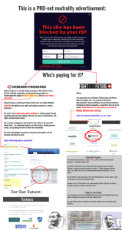
1511567054_2.png (1.6 MB, 2550x4800, 6089A7AE-F0B7-4CA7-A0AC-FC….png)
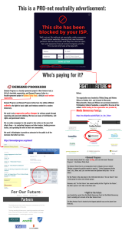
I just found this on 8/pol/. Any thoughts?
>>90412
Well, really, we can't assume every little thing funded by merchants means the whole movement is compromised.
The question about net neutrality is and will always be quite complex, no matter what we choose we have ups and downs, only a few centralized internet would have no censoring.
Well, really, we can't assume every little thing funded by merchants means the whole movement is compromised.
The question about net neutrality is and will always be quite complex, no matter what we choose we have ups and downs, only a few centralized internet would have no censoring.
>>90417
If anything, it should be replaced with something that allows more free speech and place more limits on the shady shit that companies like Facebook does, like spying, etc.
If anything, it should be replaced with something that allows more free speech and place more limits on the shady shit that companies like Facebook does, like spying, etc.
>>90412
The more I think about Net Neutrality, the less I like it. The problem, no one's big enough, influential, and cogent enough to convince the millions of internet users who have been duped through their hatred of "big business." Again, when people let their emotions lead them they will often flee from "big business" to "big government."
The sad thing is that the opportunity is long since past to do anything about this, and at this point we'd just hurt ourselves. Already it's become a rallying point against Trump and 4Chan, even by his lukewarm "supporters."
The premise of the internet is inherently flawed because of its centralized control by America. If it had been decentralized from the start like Blockchain technologies there would be no such issue.
The more I think about Net Neutrality, the less I like it. The problem, no one's big enough, influential, and cogent enough to convince the millions of internet users who have been duped through their hatred of "big business." Again, when people let their emotions lead them they will often flee from "big business" to "big government."
The sad thing is that the opportunity is long since past to do anything about this, and at this point we'd just hurt ourselves. Already it's become a rallying point against Trump and 4Chan, even by his lukewarm "supporters."
The premise of the internet is inherently flawed because of its centralized control by America. If it had been decentralized from the start like Blockchain technologies there would be no such issue.
>>91326
I'm not sure if he really is /ourguy/ or even close to that title, after all, a polished turd is still a turd.
I'm not sure if he really is /ourguy/ or even close to that title, after all, a polished turd is still a turd.
Came across this article by Gary North. I don't know if any other anons here read him, he's quite based.
https://www.garynorth.com/public/17433.cfm
https://www.garynorth.com/public/17433.cfm
here's what's actually intended by the FCC
“For almost twenty years, the Internet thrived under the light-touch regulatory approach established by President Clinton and a Republican Congress. This bipartisan framework led the private sector to invest $1.5 trillion building communications networks throughout the United States. And it gave us an Internet economy that became the envy of the world.
“But in 2015, the prior FCC bowed to pressure from President Obama. On a party-line vote, it imposed heavy-handed, utility-style regulations upon the Internet. That decision was a mistake. It’s depressed investment in building and expanding broadband networks and deterred innovation.
“Today, I have shared with my colleagues a draft order that would abandon this failed approach and return to the longstanding consensus that served consumers well for decades. Under my proposal, the federal government will stop micromanaging the Internet. Instead, the FCC would simply require Internet service providers to be transparent about their practices so that consumers can buy the service plan that’s best for them and entrepreneurs and other small businesses can have the technical information they need to innovate.
“Additionally, as a result of my proposal, the Federal Trade Commission will once again be able to police ISPs, protect consumers, and promote competition, just as it did before 2015. Notably, my proposal will put the federal government’s most experienced privacy cop, the FTC, back on the beat to protect consumers’ online privacy.
“Speaking of transparency, when the prior FCC adopted President Obama’s heavy-handed Internet regulations, it refused to let the American people see that plan until weeks after the FCC’s vote. This time, it’ll be different. Specifically, I will publicly release my proposal to restore Internet freedom tomorrow—more than three weeks before the Commission’s December 14 vote.
“Working with my colleagues, I look forward to returning to the light-touch, market-based framework that unleashed the digital revolution and benefited consumers here and around the world.”
Source: https://www.fcc.gov/document/chairman-pai-proposes-restore-internet-freedom
here's a good explaination: https://youtu.be/B03eByZia5I
overall Net neutrality socializes the cost of bandwidth people who use streaming services like netflix are to net neutrality what people with pre existing conditions are to obamacare, what they're using costs more and you have to share the burden. It's true that competition might not give us better options but if you'd rather rely and big government regulation than take risks, you're a cuck.
“For almost twenty years, the Internet thrived under the light-touch regulatory approach established by President Clinton and a Republican Congress. This bipartisan framework led the private sector to invest $1.5 trillion building communications networks throughout the United States. And it gave us an Internet economy that became the envy of the world.
“But in 2015, the prior FCC bowed to pressure from President Obama. On a party-line vote, it imposed heavy-handed, utility-style regulations upon the Internet. That decision was a mistake. It’s depressed investment in building and expanding broadband networks and deterred innovation.
“Today, I have shared with my colleagues a draft order that would abandon this failed approach and return to the longstanding consensus that served consumers well for decades. Under my proposal, the federal government will stop micromanaging the Internet. Instead, the FCC would simply require Internet service providers to be transparent about their practices so that consumers can buy the service plan that’s best for them and entrepreneurs and other small businesses can have the technical information they need to innovate.
“Additionally, as a result of my proposal, the Federal Trade Commission will once again be able to police ISPs, protect consumers, and promote competition, just as it did before 2015. Notably, my proposal will put the federal government’s most experienced privacy cop, the FTC, back on the beat to protect consumers’ online privacy.
“Speaking of transparency, when the prior FCC adopted President Obama’s heavy-handed Internet regulations, it refused to let the American people see that plan until weeks after the FCC’s vote. This time, it’ll be different. Specifically, I will publicly release my proposal to restore Internet freedom tomorrow—more than three weeks before the Commission’s December 14 vote.
“Working with my colleagues, I look forward to returning to the light-touch, market-based framework that unleashed the digital revolution and benefited consumers here and around the world.”
Source: https://www.fcc.gov/document/chairman-pai-proposes-restore-internet-freedom
here's a good explaination: https://youtu.be/B03eByZia5I
overall Net neutrality socializes the cost of bandwidth people who use streaming services like netflix are to net neutrality what people with pre existing conditions are to obamacare, what they're using costs more and you have to share the burden. It's true that competition might not give us better options but if you'd rather rely and big government regulation than take risks, you're a cuck.
Alright, here is the catch with net neutrality. It is simply a set of regulations on isps. Now, everyone likes to portray net neutrality as a "yes or no" issue, but in reality it's a lot more complex. Net neutrality has many features that could be changed or edited, without the thing being completely removed. However, due to the way Congress works, it's easier to remove an entire bill and replace it than to drag out edits and changes. In my opinion, the parts of net neutrality that restricts isps from charging data hogs like Netflix and Google more need to go. Jewgle makes bank off of NN, so anything you here about net neutrality being anti corporation is bullshit. However, the parts of NN that limit isps ability to complete restrict access to sites can stay. Too bad when the Dems created this bill they made it impossible to edit.
>>89897
Oh, and here is the problem with the Netflix argument. The ISPs would much sooner charge NETFLIX extra than charge the consumer to access Netflix. That is why Netflix is so pro NN, it allows them free access to the companies lines without having to pay for the massive amount of data they send.
Oh, and here is the problem with the Netflix argument. The ISPs would much sooner charge NETFLIX extra than charge the consumer to access Netflix. That is why Netflix is so pro NN, it allows them free access to the companies lines without having to pay for the massive amount of data they send.
>>93292
>>93291
another problem with everyone's take on this issue is that the FCC's net neutrality guidelines were introduced in the 90s and they're not under any threat, what Pai is looking to get rid of is the federal enforcement of the guidelines that the obama administration put into effect in 2015
>>93291
another problem with everyone's take on this issue is that the FCC's net neutrality guidelines were introduced in the 90s and they're not under any threat, what Pai is looking to get rid of is the federal enforcement of the guidelines that the obama administration put into effect in 2015
1513106602.png (488.0 KB, 1302x3884, Net Neutrality Is Your Ene….png)

>>94476
You keep a folder of them?
…That's a good idea. I already have the beaverpill posts, which ones do you have?
You keep a folder of them?
…That's a good idea. I already have the beaverpill posts, which ones do you have?
>>94518
Thanks!
Man, I remember that "Make Hate Facts, make them look pretty, print them out, put a QR code on them, and leave them around" campaign. Good times.
Thanks!
Man, I remember that "Make Hate Facts, make them look pretty, print them out, put a QR code on them, and leave them around" campaign. Good times.
>>94518
That thread motivated me to start my own redpill folder, and I'm not even done going through it. Thanks!
That thread motivated me to start my own redpill folder, and I'm not even done going through it. Thanks!
>>94565
You just go to Derpibooru every time you need porn? Anon, you know it's much easier to find good images when you save them as you find them.
You just go to Derpibooru every time you need porn? Anon, you know it's much easier to find good images when you save them as you find them.
>>94423
Copypasta for anyone else who wants it. No greentext for obvious reasons:
The FCC's Open Internet Rules (net neutrality rules) are extremely detrimental to the Internet's health. I urge you to repeal them.
I don't want the government to have the power to block websites, track web activity, or give bandwidth hogging websites de facto priority over others, thereby slowing all internet access.
It is the time to stop controlling the relationships between ISPs and their customers.
Centralized control over the Internet is a serious problem. Larger, more intensive websites such as Facebook, Netflix, Google and League of Legends need to pay for their bandwidth and stop receiving preferential treatment. Other consumers and businesses large and small end up paying for their essentially free data.
Courts have made clear that if the FCC ends Title II classification, the FCC must let ISPs offer "fast lanes" to websites for a fee. This is not a bad thing as it is a free contract.
Chairman Pai has made clear that he intends to do exactly this. The backlash against him has been severe, personal, and unwarranted, supported by propaganda campaigns by major companies.
The "5 most valuable companies in America" want to further enrich themselves over cable companies. This has resulted in sky-high prices for customers.
Under the Obama FCC rules, Internet giants have imposed a de facto private tax on every sector of the American economy which has enabled their monopolies.
These internet firms have been able to make it more difficult to access political speech that they don't like. They have deleted posts, suspended accounts, and spread defamatory information about individuals who want to make their voice heard. They have also helped foreign regimes suppress political dissent by sharing personal details of users.
I'm sending this to the FCC's open proceeding, but I worry that Chairman Pai, a former Verizon lawyer, may change his plans and bow to the wishes of a misinformed crowd.
So I'm also sending this to my members of Congress. Please publicly support the repeal of the FCC's existing net neutrality rules based on Title II, and support Chairman Pai's plans. Do whatever you can to enable him in his goal.
Thank you!
Copypasta for anyone else who wants it. No greentext for obvious reasons:
The FCC's Open Internet Rules (net neutrality rules) are extremely detrimental to the Internet's health. I urge you to repeal them.
I don't want the government to have the power to block websites, track web activity, or give bandwidth hogging websites de facto priority over others, thereby slowing all internet access.
It is the time to stop controlling the relationships between ISPs and their customers.
Centralized control over the Internet is a serious problem. Larger, more intensive websites such as Facebook, Netflix, Google and League of Legends need to pay for their bandwidth and stop receiving preferential treatment. Other consumers and businesses large and small end up paying for their essentially free data.
Courts have made clear that if the FCC ends Title II classification, the FCC must let ISPs offer "fast lanes" to websites for a fee. This is not a bad thing as it is a free contract.
Chairman Pai has made clear that he intends to do exactly this. The backlash against him has been severe, personal, and unwarranted, supported by propaganda campaigns by major companies.
The "5 most valuable companies in America" want to further enrich themselves over cable companies. This has resulted in sky-high prices for customers.
Under the Obama FCC rules, Internet giants have imposed a de facto private tax on every sector of the American economy which has enabled their monopolies.
These internet firms have been able to make it more difficult to access political speech that they don't like. They have deleted posts, suspended accounts, and spread defamatory information about individuals who want to make their voice heard. They have also helped foreign regimes suppress political dissent by sharing personal details of users.
I'm sending this to the FCC's open proceeding, but I worry that Chairman Pai, a former Verizon lawyer, may change his plans and bow to the wishes of a misinformed crowd.
So I'm also sending this to my members of Congress. Please publicly support the repeal of the FCC's existing net neutrality rules based on Title II, and support Chairman Pai's plans. Do whatever you can to enable him in his goal.
Thank you!
71 replies | 22 files | 1 UUIDs | Archived







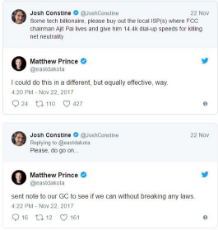
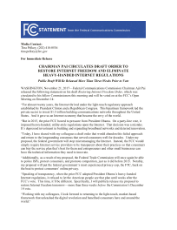
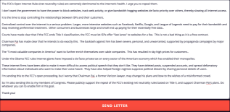








 Ex: Type :littlepip: to add Littlepip
Ex: Type :littlepip: to add Littlepip  Ex: Type :eqg-rarity: to add EqG Rarity
Ex: Type :eqg-rarity: to add EqG Rarity 